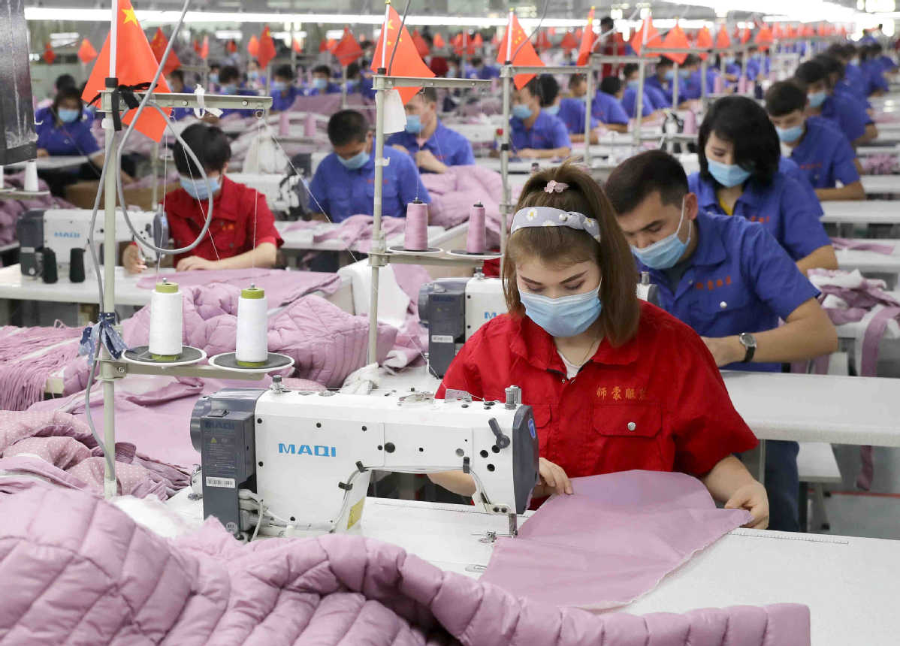
Workers make down-filled coats at a factory in Jiashi county, Xinjiang Uygur autonomous region. [Photo by Wang Zhuangfei/China Daily]
The cotton textile enterprises in the Xinjiang Uygur autonomous region all understand the importance of responsible business conduct and have increased supply chain transparency, a social responsibility report on the industry said.
As China's top cotton growing region, Xinjiang has boosted its labor-intensive textile industry since 2014 to create more job opportunities for local people, especially women. The industry plays an important role in creating jobs and increasing people's incomes and social status, said the report, which was released by the Xinjiang Textile Industry Association on Sunday.
As the region has become the preferred sourcing place for major garment brands and retailers in Europe, the United States and Japan for its high-quality cotton, constant accusations from the West that "forced labor" exists in the cotton textile industry have raised concerns in the international community during the past year, the association said.
On Jan 13, the US banned the entry of all cotton products and tomatoes produced in Xinjiang, citing alleged use of forced labor. Canada joined the United Kingdom on Jan 12 in announcing similar steps to ban the same imports for the same reason.
"The US and its close allies' restrictions on exports of Xinjiang produce and suppression of Xinjiang-based institutions and enterprises is based on fabricated information and lies," Ministry of Commerce spokesman Gao Feng said on Jan 14. "Cotton and tomato products from Xinjiang play important roles in global industrial supply chains, and restrictive measures will only worsen supply chain security and impede global economic recovery."
Xinjiang's cotton textile enterprises are in the upstream of the global supply chain, so they understand the importance of following responsible business conduct and protecting workers' rights and interests, the report said, adding there were only 98 labor disputes involving cotton textile enterprises from 2017 to 2019.
It said it is up to the workers in the industry to choose to stay in dormitories or live outside the factories. Their movements are never restricted, and the enterprises don't interfere with or limit their participation in legal religious activities, it added.
Ma Zhiguo, director of the human resources department of a textile factory in southern Xinjiang's Bayingolin Mongolian autonomous prefecture, said 386 of its 530 employees are members of the Uygur ethnic group from rural areas in southern Xinjiang. Many of them heard about vacancies at the factory from friends and families who worked there. Since the factory's pay is quite competitive, it has never experienced labor shortages, Ma said.
"How come Xinjiang people's decision to work away from home for better pay is labeled as forced labor while the same choice elsewhere is just a move to pursue a better life?" Ma said.
The factory, established in 2015, had to expand its parking lot recently because more employees have bought cars with the money they've saved so they can travel home easily, he added.
"Many workers have come to me and asked if they may lose their jobs because of the sanctions," Ma said. "It's hard to say now. But one thing for sure is that their lives will be affected by it, and it's not going to be in a good way."








